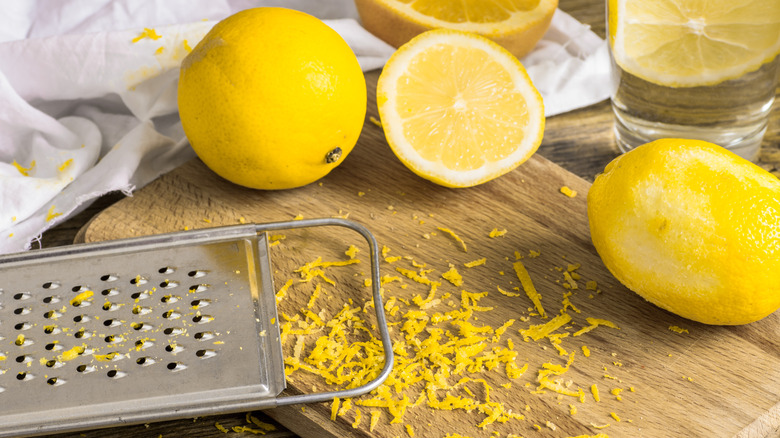Can You Substitute Lemon Zest With Dried Peels?
If you're baking or cooking often, you'll know that lemon zest can be a frequent visitor on the ingredient list. Whether it's savory items like salad dressings, or sweet muffins and pies, lemon zest can add a refreshing, citrusy flavor to your recipe. Sometimes though, you might not have a spare lemon to zest, or the time to go and buy some in store. So you may be wondering if some leftover dried peels or other lemon substitutes are a good swap when you're in a pinch. The answer really depends on what you're making.
Lemon zest comes from only the outer layer of the lemon peel, which is also known as the flavedo. This is where the oils from the lemon are stored, giving a citrusy flavor with minimal acidity. On the other hand, lemon peel (or albedo) contains both the outer and inner layer of the lemon. This makes lemon peel more bitter in taste, as it contains the lemon pith which has a tart aftertaste. So, using a substitute like dried lemon peel instead of fresh lemon zest could work, although you'll have a slightly more bitter and less bright flavor overall.
Substituting fresh lemon zest
If dried lemon peel is what you have on hand, keep in mind that its flavors will be stronger. This means that you should use less lemon peel than you would lemon zest. A ratio of ⅓ tablespoon lemon peel for 1 tablespoon lemon zest will give you the same potency of flavor. Because dried lemon peel is not liquid like other lemon substitutes, it is a great option in recipes like cookies, or macarons where liquid ratios are important.
Substituting lemon zest for lemon juice concentrate is also a possibility, but the flavor differences and ratios are important to consider. Lemon juice is more acidic than zest, but is less concentrated. An easy ratio to remember is: 2 tablespoons lemon juice for 1 teaspoon lemon zest. Lemon juice is a good substitute for desserts which will benefit from tartness, like tarts or recipes that won't be affected by extra liquid, like salad dressings.
If you happen to have lemon extract in your pantry, this can be a good lemon zest swap in terms of flavor. Although lemon extract still won't be as vibrant as fresh lemon zest, it is similarly sweet and less acidic than lemon peel or juice. Lemon extract is very concentrated, so a ratio of around ½ teaspoon of extract to 1 teaspoon of lemon zest is a good start. This makes for a good substitute in recipes where overly acidic ingredients can cause curdling, like a vanilla custard sauce or certain cake batters.
When to still opt for lemon zest
Although lemon peel, juice, and extract can be often used to substitute fresh lemon zest, this isn't always the case. Sometimes, you might be better off taking the trip to the store, or making your recipe another day. If your recipe requires more than just a few tablespoons of lemon zest, your substitution options might not cut it. If you only have liquid substitutes available, this can also be risky in desserts where the liquids to solids ratio matters.
Substituting lemon zest in recipes where lemon is one of the main elements, like lemon bars or a classic lemon tart might also not be the best idea. In this case the vibrant, citrusy flavor that lemon zest brings really affects the final result. Substituting with anything else may do your lemon-flavored recipe a disservice. If you only have acidic substitutes on hand, and your recipe has acid reactive ingredients like baking soda, it also might be better to use fresh lemon zest.


